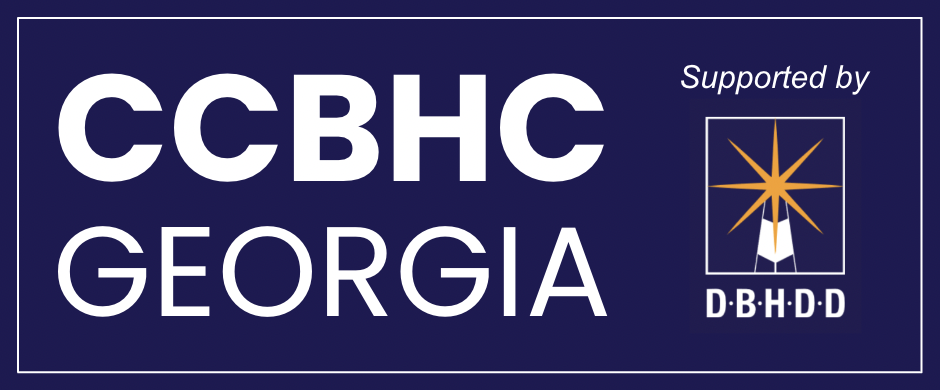
Certified Community Behavioral Health Clinics in Georgia
A CCBHC is a specially-designated clinic that provides nine types of services, with a focus on providing 24-hour crisis care, evidence-based practices, care coordination with local primary care and hospital partners, and integration with physical health care.
Potential CCBHCs must demonstrate competence to treat the individuals they serve through an extensive 3-phase certification process.
Phase One
Planning for the certification process
Dedicating resources to establish a work plan for implementation and certification
Assessing community needs and preparing to meet those needs
Phase Two
Implementing more connections to physical healthcare
Adjusting policies and procedures to the CCBHC model
Hiring staff and expanding capacity
Phase Three
Certification by the Georgia Department of Behavioral Health and Developmental Disabilities (DBHDD)
What is a Certified Community Behavioral Health Clinic (CCBHC)?
-
24/7/365 crisis services to help people stabilize in the most clinically appropriate, least restrictive, least traumatizing, and most cost-effective settings.
-
Person-centered treatment planning to customize treatment to meet needs and include available supports.
-
Screening, diagnosis, and risk assessment for mental health, addictions, and basic primary care needs can help detect and alleviate chronic diseases that drive poor health outcomes and high costs for those with behavioral health disorders.
-
Easy access to outpatient mental health and substance use care with criteria to assure a reduced wait time so those who need services can receive them when they need them, regardless of ability to pay or location of residence.
-
Case Management and care coordination to assure that people are connected to the resources they need.
-
Expanded care coordination with local primary care providers, hospitals, other health care providers, social service providers, and law enforcement, with a focus on whole health and comprehensive access to a full range of medical, behavioral, and supportive services.
-
Tailored care for active-duty military and veterans to ensure they receive the unique health support essential to their treatment.
-
Commitment to peers and family, recognizing that their involvement is essential for recovery and should be fully integrated into care.
-
Psychiatric rehabilitation, wellness, resiliency, and recovery services and support.
Who is Served by CCBHCs?
CCBHCs are designed to serve any individual age 4+ in need of care, including (but not limited to) people with serious mental illness, serious emotional disturbance, long-term chronic addiction, mild or moderate mental illness and substance use disorders, and complex health profiles.
CCBHCs will provide care regardless of ability to pay, caring for those who are underserved, have low incomes, are insured, uninsured, or on Medicaid, and those who are active-duty military or veterans.
Where will CCBHCs be located in Georgia?
The map provides a high-level view of current CCBHC candidate locations and coverage areas.
Phase One Locations in Georgia:
The Substance Abuse and Mental Health Services Administration (SAMHSA) announced five new CCBHC planning and implementation expansion grants were awarded to:
Pathways Center
View Point Health
DeKalb CSB
CSB of Middle Georgia
CHRIS 180
Additionally, Georgia will develop two CCBHCs with state-appropriated funds.
Phase Two Locations in Georgia:
Advantage Behavioral Health Systems – Athens, GA
Pineland Behavioral Health and Developmental Disabilities – Statesboro, GA
River Edge Behavioral Health – Macon, GA
New Horizons Behavioral Health- Columbus, GA
“My CCBHC helped me at a time when I didn’t know where to go. They helped me get to a better place faster, and I am grateful.”
— CCBHC patient, South Georgia
Join our mailing list.
Receive updates on CCBHCs and their work to provide whole-patient care, useful resources, and ways to engage with a CCBHC as a patient and supporter.

